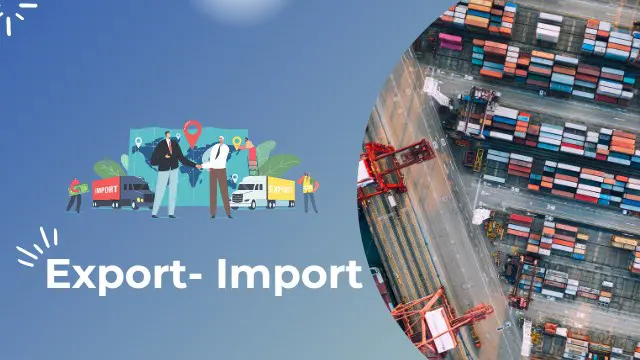
Import/Export Operations: Organising Successful International Trade
Explore Now | Exclusive Learning Materials| FREE Certification by REED| Lifetime Access | 24/7 support
EDURISE
Summary
- Certificate of completion - Free
- Reed Courses Certificate of Completion - Free
- Tutor is available to students
Add to basket or enquire
Overview
Unlock Global Opportunities with Export-Import Training
Are you intrigued by the vast world of international trade and commerce? Do you wish to dive into the dynamic field of import and export without the jargon and complexities? Our Export-Import Training is your passport to success in the global marketplace.
Why Export-Import Training Matters:
In today's interconnected world, businesses of all sizes are tapping into international markets to expand their horizons and increase profitability. This surge in global trade has created a growing demand for experts who understand the nuances of import and export operations.
Data-Driven Insights:
Let's delve into the data to understand why this training is crucial for your career and business:
Global Trade Growth: International trade continues to grow, with global exports reaching trillions of dollars annually. Businesses are actively seeking professionals who can navigate this expansive market.
Diverse Career Opportunities: Export-import professionals are in demand across various sectors, including manufacturing, agriculture, technology, and more. They hold roles such as logistics coordinators, trade analysts, and supply chain managers.
Business Expansion: For entrepreneurs and business owners, understanding export-import procedures is essential for expanding your market reach. Entering foreign markets can significantly boost your revenue.
Cost Savings: Effective import-export strategies can lead to cost savings through optimized supply chain management and access to more affordable resources.
Course Highlights:
Our Export-Import Training offers a comprehensive understanding of the global trade landscape. Here's a sneak peek into what you'll learn:
Module 1: Introduction to International Trade: Gain insights into the fundamentals of global trade, trade agreements, and economic factors that shape international commerce.
Module 2: Export Procedures and Documentation: Master the intricacies of export documentation, customs regulations, and compliance requirements.
Module 3: Import Regulations and Customs Clearance: Navigate the complexities of importing, including tariff codes, duties, and customs clearance procedures.
Module 4: Risk Management and Compliance: Learn how to mitigate risks associated with international trade and ensure compliance with trade regulations.
Module 5: Logistics and Supply Chain: Explore the logistics involved in global trade, from shipping methods to warehousing and distribution.
Who Should Enroll:
- Business Owners and Entrepreneurs
- Supply Chain Managers
- Import-Export Coordinators
- Trade Analysts
- Logistics Professionals
- Aspiring Global Trade Enthusiasts
Your Gateway to Global Success:
Equip yourself with the knowledge and skills needed to excel in the world of import and export. Our Export-Import Training is designed to provide you with practical insights, ensuring you can make informed decisions and seize international opportunities.
Don't miss your chance to be part of the thriving global trade landscape. Enroll today and step into a world of limitless possibilities. Your global journey starts here.
Free Gift
- Course Completion PDF Certificate
- Tutor Support
- Free Session with professionals
Curriculum
Course media
Description
Learning Outcomes for Export-Import Business Course:
Module 1 – Introduction to Export/Import Business:
- Outcome 1: Develop a foundational understanding of the export-import industry, including its significance, key players, and global trade trends.
- Outcome 2: Identify the essential components of international trade, such as trade regulations, documentation, and trade finance.
Module 2 – Setting Up Business:
- Outcome 3: Learn the steps involved in establishing an export-import business, including legal requirements, business planning, and market research.
- Outcome 4: Understand the factors to consider when choosing the appropriate business structure for international trade operations.
Module 3 – Buyers and Product Preparation:
- Outcome 5: Explore strategies for identifying potential buyers and target markets.
- Outcome 6: Gain insights into product selection, adaptation, and quality control to meet international standards and customer expectations.
Module 4 – Methods and Channels:
- Outcome 7: Evaluate various export and import methods and channels, such as direct exporting, intermediaries, and e-commerce platforms.
- Outcome 8: Understand the advantages and disadvantages of different distribution and sales channels in the global market.
Module 5 – Developing a Marketing Plan:
- Outcome 9: Create a comprehensive marketing plan tailored to international markets, considering market segmentation, positioning, and branding.
- Outcome 10: Learn effective promotional strategies to attract global customers and build brand recognition.
Module 6 – Shipping Your Products:
- Outcome 11: Master the logistics of shipping, including transportation modes, incoterms, and documentation required for smooth cargo movement.
- Outcome 12: Gain proficiency in handling customs procedures, tariffs, and import/export restrictions.
Module 7 – E-Exporting:
- Outcome 13: Explore the potential of e-exporting and e-commerce platforms in expanding international reach.
- Outcome 14: Learn how to set up and manage online stores, digital marketing campaigns, and secure online payment systems for global customers.
Module 8 – Pricing, Quotations, and Terms:
- Outcome 15: Develop pricing strategies that consider factors like production costs, currency fluctuations, and market competition.
- Outcome 16: Create accurate quotations and negotiate terms of trade that benefit both your business and international partners.
Module 9 – Risk Management:
- Outcome 17: Identify potential risks in international trade, including political, financial, and operational risks.
- Outcome 18: Learn strategies to mitigate risks, such as insurance, risk assessment, and contingency planning.
Module 10 – Technology in Global Trade:
- Outcome 19: Understand the role of technology in streamlining export-import processes, including trade automation, data analytics, and supply chain management.
- Outcome 20: Explore emerging trends and technologies that can enhance your competitiveness in the global market.
By completing this Export-Import Business course, you will be equipped with the knowledge and skills needed to navigate the complex world of international trade successfully. Whether you are a business owner, entrepreneur, or aspiring trade professional, this course will empower you to engage in global commerce with confidence.
Certificate of Completion
After completing the Export-Import diploma course, you will be able to obtain your free PDF certificate of course completion.
Who is this course for?
Ideal Audience for the Export-Import Business Course:
Business Owners and Entrepreneurs: Small business owners looking to expand their operations globally and entrepreneurs planning to start an export-import venture will benefit from this course. They will gain the knowledge needed to establish and grow successful international trade businesses.
Sales and Marketing Professionals: Sales and marketing experts seeking to understand global market dynamics, customer behavior, and international marketing strategies will find this course valuable. It will help them develop effective strategies for selling products and services internationally.
International Trade Enthusiasts: Individuals interested in the field of international trade and commerce, even without prior experience, can use this course to build a strong foundation. It serves as an excellent starting point for those considering a career in global trade.
Supply Chain and Logistics Professionals: Professionals working in supply chain management, logistics, and transportation will gain insights into the intricacies of global shipping, customs procedures, and supply chain optimization, which are crucial for efficient international trade.
Import-Export Managers: Current import-export managers and professionals seeking to enhance their skills and keep up with the latest trends in global trade will find this course beneficial. It provides advanced knowledge to help them excel in their roles.
Business Consultants: Consultants and advisors who assist businesses in entering international markets can use this course to stay up-to-date with industry practices and provide valuable guidance to their clients.
Graduate Students and Aspiring Professionals: Students pursuing degrees in business, international trade, or related fields, as well as recent graduates looking to build expertise in global business, can use this course to supplement their education and improve their career prospects.
Government and Trade Officials: Government employees and trade regulators involved in international trade policy and regulation can gain insights into the challenges and opportunities faced by businesses engaged in global trade.
Export Development Agencies: Organizations focused on promoting exports can train their staff with this course to better support local businesses in expanding their international presence.
Manufacturers and Product Suppliers: Companies involved in manufacturing or supplying products can use this course to understand how to prepare products for export, find international buyers, and optimize shipping processes.
Overall, this course caters to a broad audience interested in export-import business operations and strategies, making it a valuable resource for anyone looking to succeed in the global marketplace.
Requirements
Requirements
The Export-Import course has no formal entry requirements. However, to study the Export-Import course students must:
Have passion for virtual learning
Have a good understanding of English, as well as numeracy and IT skills
Have a desire for Export-Import topic
Career path
- Export-Import Coordinator: Entry-level position with a typical UK salary ranging from £22,000 to £30,000 per year.
- Export-Import Specialist or Analyst: With experience and expertise, salary can advance to between £31,000 and £50,000 annually.
- Export-Import Manager or Director: Experienced professionals in these roles may earn £51,000 to £80,000 or more, depending on expertise .
Questions and answers
Currently there are no Q&As for this course. Be the first to ask a question.
Certificates
Certificate of completion
Digital certificate - Included
Reed Courses Certificate of Completion
Digital certificate - Included
Will be downloadable when all lectures have been completed.
Reviews
Currently there are no reviews for this course. Be the first to leave a review.
Legal information
This course is advertised on reed.co.uk by the Course Provider, whose terms and conditions apply. Purchases are made directly from the Course Provider, and as such, content and materials are supplied by the Course Provider directly. Reed is acting as agent and not reseller in relation to this course. Reed's only responsibility is to facilitate your payment for the course. It is your responsibility to review and agree to the Course Provider's terms and conditions and satisfy yourself as to the suitability of the course you intend to purchase. Reed will not have any responsibility for the content of the course and/or associated materials.


